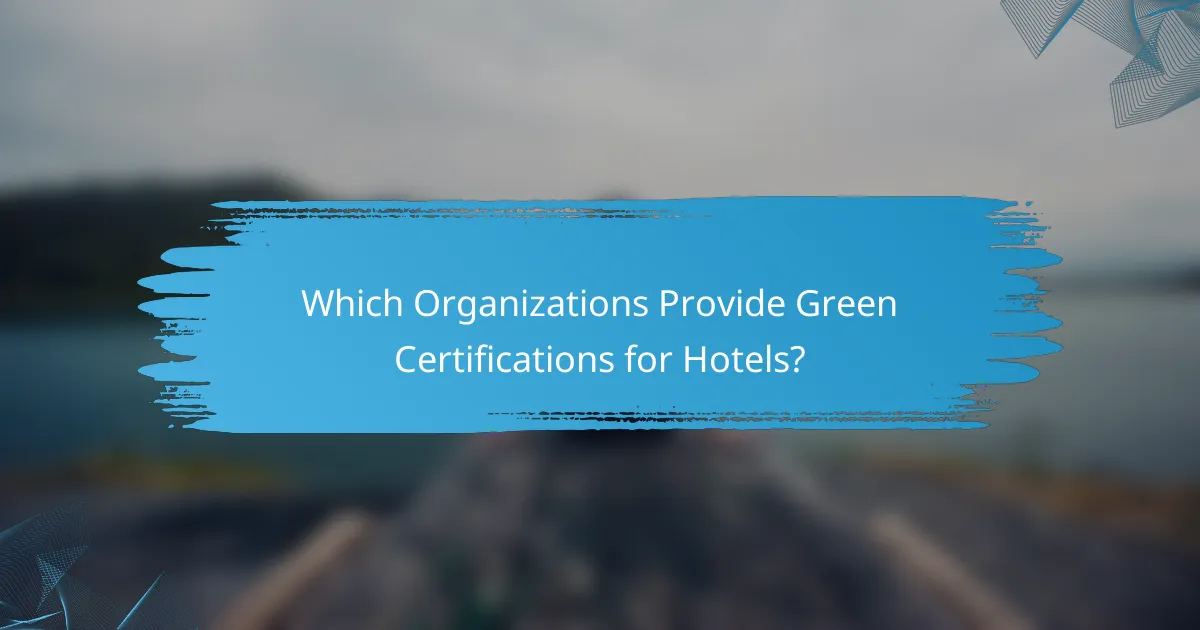Green certifications are essential for hotels in Southern Europe, enhancing sustainability and attracting eco-conscious travellers. This article explores various types of certifications, such as Green Key and EarthCheck, their importance in improving operational efficiency, and notable examples of certified hotels that exemplify eco-friendly practices. Understanding these aspects can help hotels boost their marketability and commitment to environmental responsibility.

Why are Green Certifications Important for Hotels in Southern Europe?
Green certifications are crucial for hotels in Southern Europe as they enhance sustainability practices, attract eco-conscious travellers, and improve operational efficiency. These certifications, such as Green Key and EarthCheck, validate a hotel’s commitment to environmental responsibility. By adopting these standards, hotels can reduce energy consumption by up to 30%, lower waste production, and enhance their marketability. As a result, green certifications not only promote environmental stewardship but also contribute to long-term profitability and customer loyalty.
What Environmental Benefits Do Green Certifications Provide?
Green certifications for hotels in Southern Europe provide significant environmental benefits, including reduced energy consumption and lower carbon emissions. These certifications encourage sustainable practices like waste reduction and water conservation, promoting biodiversity. For example, hotels certified by organizations like Green Key often implement energy-efficient systems and eco-friendly materials. As a result, they contribute to local environmental preservation and enhance their market appeal.
How Do Green Certifications Influence Guest Choices?
Green certifications significantly influence guest choices by showcasing a hotel’s commitment to sustainability. Guests increasingly prefer eco-friendly accommodations, which can enhance brand loyalty and attract environmentally conscious travellers. Certifications like Green Key or EarthCheck signal responsible practices, improving marketability and guest satisfaction. As a result, hotels with these certifications often experience higher occupancy rates and positive reviews.
What Economic Advantages Do Certified Hotels Experience?
Certified hotels experience significant economic advantages, including increased occupancy rates and enhanced brand loyalty. Green certifications attract eco-conscious travellers, leading to higher demand. Additionally, these hotels often benefit from reduced operational costs through energy efficiency and waste reduction. Many certified hotels receive tax incentives or grants, further improving profitability.

Which Organizations Provide Green Certifications for Hotels?
Several organizations provide green certifications for hotels in Southern Europe, including Green Key, EarthCheck, and the EU Ecolabel. These certifications assess environmental performance and sustainability practices. Green Key focuses on eco-friendly management, while EarthCheck offers a scientific approach to sustainability. The EU Ecolabel covers a broad range of environmental criteria. Each certification emphasizes different attributes, helping hotels improve their green initiatives and attract eco-conscious travellers.
What Are the Key Certification Programs Available?
Key certification programs for green hotels in Southern Europe include EU Ecolabel, Green Key, and EarthCheck. These certifications emphasize sustainability practices, energy efficiency, and waste reduction. Each program has unique criteria tailored to regional environmental standards, promoting responsible tourism and enhancing marketability. For example, Green Key focuses on educational initiatives for guests and staff, while EarthCheck utilizes scientific benchmarking to measure sustainability performance.
How Do These Organizations Ensure Compliance?
Organizations ensure compliance with green certifications through rigorous standards, regular audits, and staff training. They follow specific guidelines set by certification bodies, which include environmental management practices and sustainability metrics. For example, the Green Key certification requires hotels to meet criteria in areas such as energy efficiency and waste management. Compliance is monitored through periodic assessments and feedback mechanisms to maintain certification status.

What Types of Green Certifications Exist for Hotels?
Several types of green certifications exist for hotels, including LEED, Green Key, and EarthCheck. These certifications assess sustainability practices and environmental impact. LEED focuses on energy efficiency and resource conservation. Green Key emphasizes eco-friendly operations and guest engagement. EarthCheck evaluates environmental management systems. Each certification enhances a hotel’s reputation and attracts environmentally conscious travellers.
How Does the LEED Certification Work?
LEED certification for hotels assesses sustainability and energy efficiency through a point-based system. It evaluates various attributes such as site selection, water usage, energy efficiency, and indoor environmental quality. Hotels earn points across these categories to achieve different certification levels: Certified, Silver, Gold, or Platinum. This process encourages environmentally responsible practices, enhancing the hotel’s marketability and reducing operational costs.
What is the Green Key Eco-Rating System?
The Green Key Eco-Rating System is an international certification for hotels that promotes sustainable practices. It evaluates environmental management, energy efficiency, and waste reduction. This system encourages hotels to minimize their ecological footprint while enhancing guest experience. Establishments with this certification often attract eco-conscious travellers, highlighting their commitment to sustainability.
What Unique Features Does the EarthCheck Certification Offer?
EarthCheck Certification offers unique features such as a comprehensive sustainability framework, tailored benchmarking, and a focus on continuous improvement. It emphasizes environmental management, community engagement, and social responsibility, making it distinct among green certifications for hotels. Additionally, EarthCheck provides access to a global network of certified businesses, enhancing collaboration and knowledge sharing.

How Do Hotels Achieve and Maintain Green Certifications?
Hotels achieve and maintain green certifications by implementing sustainable practices and meeting specific environmental standards. These certifications, such as Green Key and EarthCheck, require hotels to reduce energy consumption, manage waste effectively, and promote eco-friendly initiatives. Regular audits and adherence to guidelines ensure ongoing compliance. For example, hotels may adopt renewable energy sources and engage in local conservation efforts to enhance their sustainability profile. The importance of these certifications lies in attracting environmentally conscious travellers and improving operational efficiency.
What Steps Are Involved in the Certification Process?
The certification process for green certifications in hotels involves several key steps. First, hotels must assess their current sustainability practices. Next, they identify the appropriate certification program that aligns with their goals. Then, they implement necessary changes to meet the criteria set by the chosen program. Afterward, hotels submit an application along with required documentation. Finally, an independent audit is conducted to verify compliance, leading to certification if standards are met.
Which Common Challenges Do Hotels Face During Certification?
Hotels face several common challenges during certification, including high costs, complex documentation, and varying standards. Financial constraints can hinder investment in sustainable practices. Navigating the intricate certification process requires extensive paperwork and adherence to diverse regulations. Additionally, maintaining compliance with evolving environmental standards poses ongoing difficulties.

What Are Some Notable Examples of Certified Hotels in Southern Europe?
Notable examples of certified hotels in Southern Europe include Hotel Villa Honegg in Switzerland, which boasts a Green Key certification, and Hotel Ariston in Italy, recognized for its EarthCheck certification. These hotels exemplify sustainable practices and eco-friendly initiatives, enhancing their appeal to environmentally conscious travellers. Other examples are the Hotel Alhambra Palace in Spain, certified by the Biosphere Responsible Tourism, and the Hotel Savoy in Croatia, which holds the Green Globe certification. Each of these hotels showcases unique attributes that contribute to their sustainability efforts.
Which Hotels Have Achieved LEED Certification?
Several hotels in Southern Europe have achieved LEED certification, demonstrating their commitment to sustainability. Notable examples include the Hotel Arts in Barcelona, the Hilton Garden Inn in Florence, and the Radisson Blu in Athens. These hotels showcase energy efficiency, water conservation, and sustainable materials. LEED certification enhances their marketability and attracts eco-conscious travellers.
What Makes the Green Key Certified Hotels Stand Out?
Green Key Certified Hotels stand out due to their commitment to sustainable practices and environmental responsibility. These hotels implement energy-saving measures, waste reduction strategies, and water conservation techniques. They also engage in community initiatives and prioritize eco-friendly products. This certification enhances their reputation and attracts environmentally conscious travellers. Additionally, Green Key hotels often provide educational resources to guests, promoting awareness about sustainability.
How Are EarthCheck Certified Hotels Making an Impact?
EarthCheck certified hotels significantly reduce their environmental impact through sustainable practices. These hotels implement energy-efficient systems, water conservation measures, and waste management programs. As a result, they contribute to local biodiversity and promote sustainable tourism. The certification also enhances their marketability, attracting eco-conscious travellers.

What Trends Are Emerging in Green Certifications for Hotels?
Emerging trends in green certifications for hotels in Southern Europe emphasize sustainability, energy efficiency, and guest engagement. Hotels are increasingly adopting certifications like LEED and Green Key to showcase their commitment to environmental responsibility.
The importance of these certifications lies in enhancing brand reputation, attracting eco-conscious travellers, and reducing operational costs. For example, hotels with green certifications often experience lower energy bills due to efficient practices.
Notable examples include the Hotel Casa 1800 in Granada, which employs solar energy and water conservation techniques, and the Hotel Sercotel in Valencia, recognized for its waste reduction initiatives.
These trends reflect a growing consumer demand for sustainable practices in the hospitality sector, pushing more hotels to seek certification and implement eco-friendly measures.
How Are Technological Innovations Shaping Sustainability Practices?
Technological innovations significantly enhance sustainability practices in hotels across Southern Europe. These advancements streamline energy management, reduce waste, and promote eco-friendly operations.
For example, smart building technologies optimize energy use by adjusting heating and cooling based on occupancy. Additionally, digital platforms facilitate efficient resource management, allowing hotels to track and minimize their environmental impact.
Green certifications, such as LEED and Green Key, validate these efforts, showcasing hotels’ commitment to sustainability. These certifications also attract environmentally conscious travellers, boosting occupancy rates.
As a result, technological innovations not only improve operational efficiency but also contribute to a more sustainable hospitality industry in Southern Europe.
What Role Do Local Regulations Play in Certification Trends?
Local regulations significantly influence certification trends for hotels in Southern Europe. They establish standards that hotels must meet to achieve green certifications, ensuring compliance with environmental practices. These regulations often dictate the types of certifications available, such as energy efficiency and waste management. As a result, hotels are increasingly adopting sustainable practices to align with local mandates, enhancing their marketability and appeal to eco-conscious travellers.
Which Future Developments Are Expected in Green Certifications?
Future developments in green certifications for hotels in Southern Europe are expected to focus on enhanced sustainability standards, technology integration, and consumer awareness. The introduction of stricter regulations will push hotels to adopt eco-friendly practices. Digital tools will streamline certification processes, improving transparency and efficiency. Additionally, increased consumer demand for sustainable travel options will drive hotels to pursue certifications actively, ensuring they meet evolving expectations.
What Best Practices Should Hotels Follow to Maintain Certifications?
Hotels should implement systematic practices to maintain green certifications. Regular audits ensure compliance with sustainability standards. Staff training on eco-friendly practices enhances operational efficiency. Engaging with local communities fosters support and collaboration. Documenting sustainability efforts showcases commitment to stakeholders.